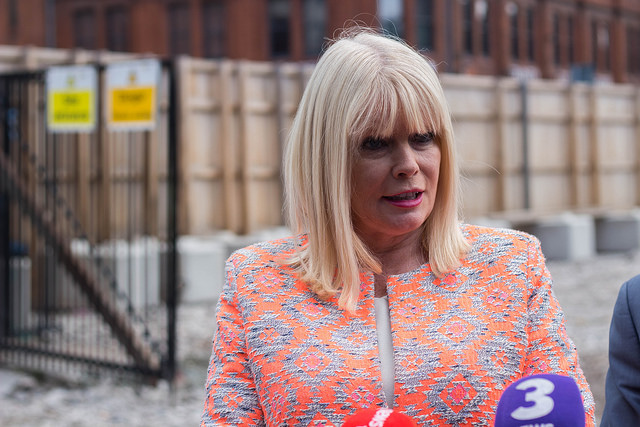After years of calls for increased action to prevent sexual assault on Irish campuses, the government has allocated €400,000 today towards ending sexual violence in higher education.
Minister for Higher Education Mary Mitchell O’Connor launched a framework, entitled “Safe, Respectful, Supportive and Positive – Ending Sexual Violence and Harassment in Irish Higher Education Institutions”, outlining policies for Irish colleges. The initiative aims to ensure that the sexual culture on campuses across the country is safe and informed.
In a press statement, Minister Mitchell O’Connor said: “Sexual violence and harassment has no place in our institutions. It is unacceptable that any student, researcher or staff member should experience it.”
Se continued: “Through the development of this framework, I believe we can escalate an institutional culture change on our campuses. Institutions have a duty of care to their students and staff and this framework is about instigating change.”
Mitchell O’Connor said that she hopes that the outcome of this framework will be “comprehensive and game-changing”.
In a press statement, the President of the Union of Students in Ireland (USI), Síona Cahill, said: “The student experience is one highlighted to us by students and their Students’ Unions across the country, and the issues of sexual harassment and non-consensual experiences at third level and within this age cohort didn’t start today or yesterday, we’re just finally being heard when we speak about them.”
“We are not being dramatic, we are not being ‘shrill’, we’re calling out an epidemic”, Cahill said.
The policy was developed by an expert advisory group made up of students, academics and experts in the area of sexual health among students. Some €400,000 in funding will be made available to higher education institutions over the next year to assist in implementing the recommendations made by the expert group.
Mitchell O’Connor said that the group, which was chaired by Anne Looney of Dublin City University (DCU), did “a remarkable job” of developing the framework.
The framework will focus on four distinct areas: institutional culture, institutional processes, institutional policies and targeted initiatives. It is hoped that the implementation of new policies will improve the reporting mechanisms for students who experience sexual assault. The framework also encourages activities promoting understanding of consent.
Mitchell O’Connor said she is “very proud” of the framework. “Funding is available to support this, and I look forward to its whole-hearted adoption by our institutions.”
The new policies were developed following a workshop Minister Mitchell O’Connor convened last October. The aim of the workshop was to hear first-hand from institutions, academics and students about what was really happening in our higher education institutions with regard to sexual violence and harassment.
Trinity has been tackling the issue of consent of campus for several years now, with Trinity College Dublin Students’ Union (TCDSU) being one of the earliest adopters of consent classes. Mandatory workshops on sexual consent were introduced by TCDSU in 2016, after a survey conducted among students revealed that one in four women and one in 20 men had experienced a non-consensual sexual experience
Trialled first in Trinity Hall, the workshops were attended by 400 students, before being revised in accordance with participants’ feedback. In 2017, the workshops saw an attendance rate of over 90 per cent and received international attention.
Last year, Trinity approved a €15,000 expansion of consent workshops, committing to cover the costs of the project. Speaking to The University Times at the time, TCDSU Welfare Officer Damien McLean said he was “delighted” with the decision.
The expansion of the consent workshops has seen the classes offered to sports clubs and societies on campus. The proposal also included plans to eventually bring the classes to all Trinity student accommodation, including in Kavanagh Court, the Binary Hub and the yet-to-be-built Oisín House complex.
Last month, the union released a 12-page document providing guidelines for reporting sexual assault and rape in College. The document, entitled “What Do I Do Now?”, was sent to all students in TCDSU’s weekly email. It features information on sexual consent, specific guidelines for reporting sexual assault and harassment, details of College services that can help with reporting such incidents, and guidelines on reporting sexual misconduct to the Gardaí.
The document encourages those who have been affected by sexual misconduct to make a written, dated record of what they can remember, take a photo of the record, and put themselves in a safe environment. It also outlines ways to disclose the incident to relevant authorities.
More recently, TCDSU council voted to support the introduction of a full-time intern for sexual consent education and development, funded using up to €60,000 provided by the Higher Education Authority.
The intern will work with the College’s Counselling Service, which provides consent workshops to students in Trinity Hall, along with society groups.







